
Our commitment to the environment.
Why organic?
Enjoy the comfort and freedom of wearing breathable, natural fabrics. All stages of production have minimal impact on the environment: from picking to transportation, weaving and dyeing, and through to packaging. Our partners at Anjaly are proud to hold certification under the Global Organic Textile Standard (GOTS), guaranteeing that all their clothing is produced from organic cotton and bamboo fabrics.
In the words of Anjaly’s owner and designer, Gili Ravid: “We may not be able to save the world, but we can try, wherever possible, to behave in it with gentleness and respect.”
Organic cotton
Organic cotton is grown with minimal damage to the environment. No pesticides or chemicals are used throughout the process, and with 80% rain-fed irrigation, the result is a high-quality, lightweight textile that respects the environment, the growers, and those who wear the fabric.
Linen
Linen fabric is made from the cellulose fibers of the flax plant. Flax has served humanity for tens of thousands of years, and was used in fabrics dating back to Ancient Egypt. It became a symbol of purity and protection from evil.
Linen tends to be underused in the fashion industry because of its high production and handling costs but, in our view, its unique characteristics justify the effort. The structure of the flax fiber allows absorption and quick drying, which gives linen its excellent capacity for natural cooling and thermal insulation. Linen is non-allergenic, antibacterial, antiseptic, and anti-static. So many anti’s, that we’re all for it!
Bamboo
Bamboo is a relatively new and exciting material in the textile world. The resulting fabric has a natural brilliance that resembles silk. The fibers breathe and are lighter than other natural fabrics, making it perfect for yogawear.
Bamboo is an environmentally-friendly crop that requires little water and no fertilizer. The impressive rate of bamboo growth (some varieties grow a meter a day!) ensures that there is no fear of its disappearance. Bamboo grows very densely so the area of cultivated land is reduced. Many communities around the world are switching to bamboo crops to preserve open spaces and keep the forests around them free of cultivation.
Tencel and Modal fabrics
Like bamboo, these fabrics are relatively recent additions to the world of textiles. Tencel and modal are sourced from wood and other organic materials, then manufactured with advanced technology. Although industrial, and seemingly light years from organic, the weave is an innovation in environmental protection. Made from trees grown in forests under strict supervision, the production process is energy efficient, non-polluting, with a particularly low carbon dioxide footprint. Both fabrics are soft to the skin, breathable and absorbent, antibacterial, and highly resistant to the effects of time, weather and the environment – in other words, tencel and modal fabrics are unlikely to fade, shrink or crease.
Discover our clothing collection here.
